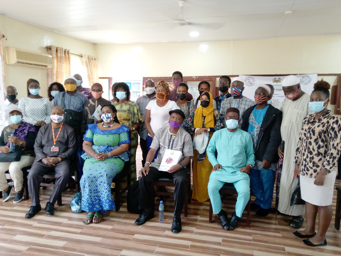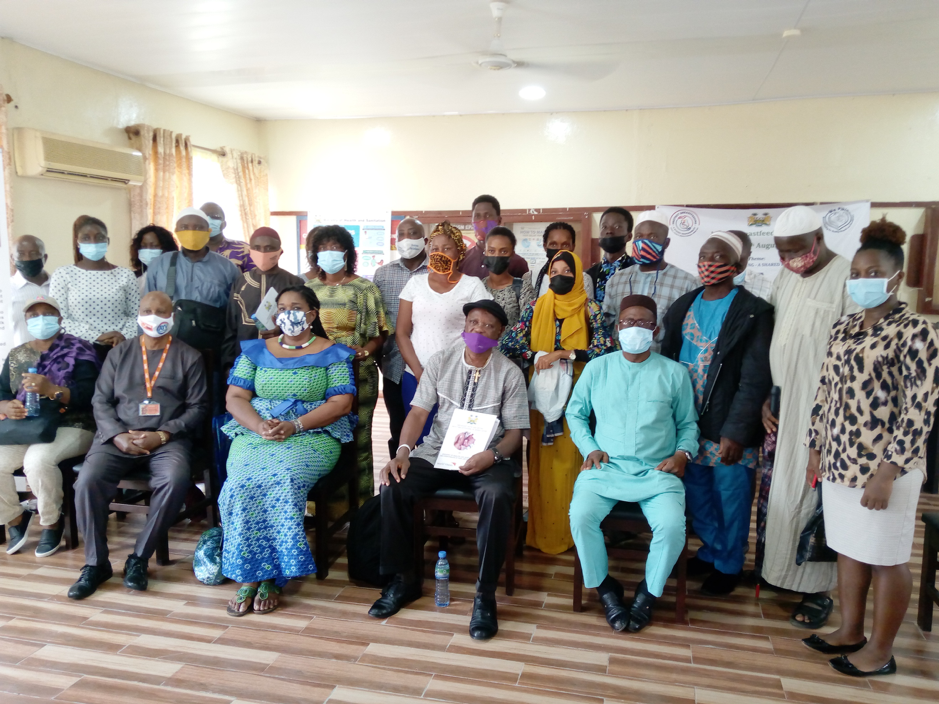
By Kemo Cham, KMN
The Ministry of Health and its partners hope to leverage the influence of religious leaders to bridge the gap in breastfeeding in the country.
Officials and campaigners made this point on Wednesday, 18 August during a symposium organized for the religious wing of Kombra Network – the Christian Action Group (CRISTAG) and the Islamic Action Group (ISLAG).
The event at the conference hall of the Council of Churches Sierra Leone in Freetown brought together 30 Imams and Pastors from the Western Area Urban and Rural (Freetown and its environs.
“Your voice is strong. We listen to you and take your advice through preaching. If you tell us to breastfeed our children it is likely to be adhered to. That is why we call on you,” chairman of the event, John Tamba Allieu, who is the Public Relations Officer in the Ministry of Health and Sanitation (MoHS), said in his opening statement.
Mr Allieu says religious leaders are expected to use their influence and platforms to help promote the practice of breastfeeding, in the face of apathy caused by myths and misconceptions.
The event was part of commemoration of World Breastfeeding Week (WBW) 2021.
WBW is commemorated every year, usually within the first week of August, to review efforts in promoting breastfeeding. The MoHS, through its Directorate of Food and Nutrition (DFN) and partners, including FOCUS 1000, held several meetings with key influential groups in society in the last three weeks.
The global theme for this year’s commemoration of the WBW is: ‘Protecting breastfeeding, a shared responsibility.’
Officials and campaigners say everyone has a role to play to change negative public perception about breastfeeding.
For Sierra Leone, the campaign is part of a large battle against child malnutrition, which is a major contributor to the country’s high rate of maternal and infant mortality.
The World Health Organization (WHO) considers breastmilk as the best source of nutrients for babies and infants. And it especially recommends exclusive breastfeeding for the first six months of life.
Official data show that Sierra Leone has made a huge progress in breastfeeding in the last decade, although campaigners say the gap is still huge. According to the Sierra Leone Demographic Health Survey (DHS) 2013, only 32 percent of babies were exclusively breastfed. The 2019 DHS show an increase to 54 percent.
Solade Pyne-Bailey, Principal Nutritionist at the DFN, says the goal is to attain 80 percent by 2030, in line with the UN Sustainable Development Goals.

Last month campaigners celebrated a breakthrough after parliament enacted the much-anticipated Code on breastmilk substitutes, which, among others, is geared towards regulating the breastmilk substitutes market.
According to Ms Pyne-Bailey, another major concern for the government is to cut down on the practice of giving babies water and other food substances within their first six months of life in addition to breastmilk. According to the 2019 SLDHS, 19 percent of babies are given water within this period, a practice informed by intrenched cultural beliefs, and which has been blamed for many child illnesses and deaths.
“We found out that water is the most common substance mothers give to their babies,” says Amie Lompri Kamara of the UN children’s agency, UNICEF, referring to the 2019 DHS findings.
“Breastmilk is free, cost nothing and available at any time,” she stressed, noting that breastmilk constitutes about 80 percent of water, dispelling widespread concerns as justification for the practice.
“Hundred percent of the food a child needs is all in the breastmilk,” adds nutritionist Mariama Ellie in the MoHS, as part of a presentation to the Kombra Network members.
At the beginning of the month, Sierra Leone’s Health Minister Dr Austin Denby launched a ‘no water campaign’ alongside the WBW celebrations. Dubbed ‘Stronger with Breastmilk Only Initiative’, the campaign seeks to discourage parents from giving their newborn babies water.
Hannah Yankson, WHO’s National Professional Officer for Nutrition and Food Safety, says religious leaders could make a huge difference in efforts to dispel myths and misconceptions that are discouraging women from breastfeeding their babies.
“It is no longer business as usual. We need to change our strategy. We need a plan to approach it,” she says.
Mohamed Bailor Jalloh, Chief Executive Officer of
FOCUS 1000, described as strategic the use of religious leaders in the campaign to promote breastfeeding.
“We believe that the message is important, but the messenger is equally important,” says Jalloh, noting that if an important message is given to the wrong person, it could be counterproductive.



